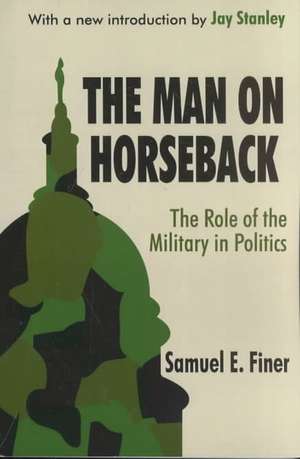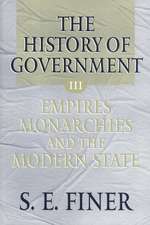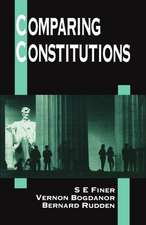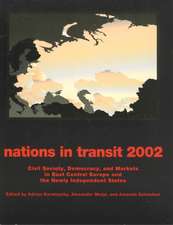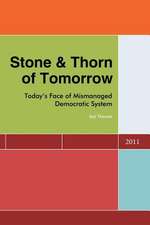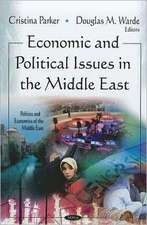The Man on Horseback: The Role of the Military in Politics
Autor Samuel Fineren Limba Engleză Paperback – 31 aug 2002
| Toate formatele și edițiile | Preț | Express |
|---|---|---|
| Paperback (1) | 415.24 lei 6-8 săpt. | |
| Taylor & Francis – 31 aug 2002 | 415.24 lei 6-8 săpt. | |
| Hardback (1) | 1109.18 lei 6-8 săpt. | |
| Taylor & Francis – 14 iul 2017 | 1109.18 lei 6-8 săpt. |
Preț: 415.24 lei
Nou
Puncte Express: 623
Preț estimativ în valută:
79.47€ • 81.98$ • 67.26£
79.47€ • 81.98$ • 67.26£
Carte tipărită la comandă
Livrare economică 05-19 martie
Preluare comenzi: 021 569.72.76
Specificații
ISBN-13: 9780765809223
ISBN-10: 0765809222
Pagini: 294
Ilustrații: 1
Dimensiuni: 152 x 229 x 18 mm
Greutate: 0.43 kg
Ediția:1
Editura: Taylor & Francis
Colecția Routledge
Locul publicării:Oxford, United Kingdom
ISBN-10: 0765809222
Pagini: 294
Ilustrații: 1
Dimensiuni: 152 x 229 x 18 mm
Greutate: 0.43 kg
Ediția:1
Editura: Taylor & Francis
Colecția Routledge
Locul publicării:Oxford, United Kingdom
Cuprins
Chapter One: The Military in the Politics of Today; Chapter Two: The Political Strengths of the Military; Chapter Three: The Political Weaknesses of the Military; Chapter Four: The Disposition to Intervene (1) Motive; Chapter Five: The Disposition to Intervene (2) Mood; Chapter Six: The Opportunity to Intervene; Chapter Seven: The Levels of Intervention (1) Countries of Developed Political Culture; Chapter Eight: The Levels of Intervention (2) Countries of Low Political Culture; Chapter Nine: The Levels of Intervention: (3) Countries of Mimimal Political Culture; Chapter Ten: The Modes of Intervention; Chapter Eleven: The Results of Intervention – The Military Regimes; Chapter Twelve: The Past and the Future of Military Intervention
Descriere
The role of the military in a society raises a number of issues: How much separation should there be between a civil government and its army? Should the military be totally subordinate to the polity? Or should the armed forces be allowed autonomy in order to provide national security?
